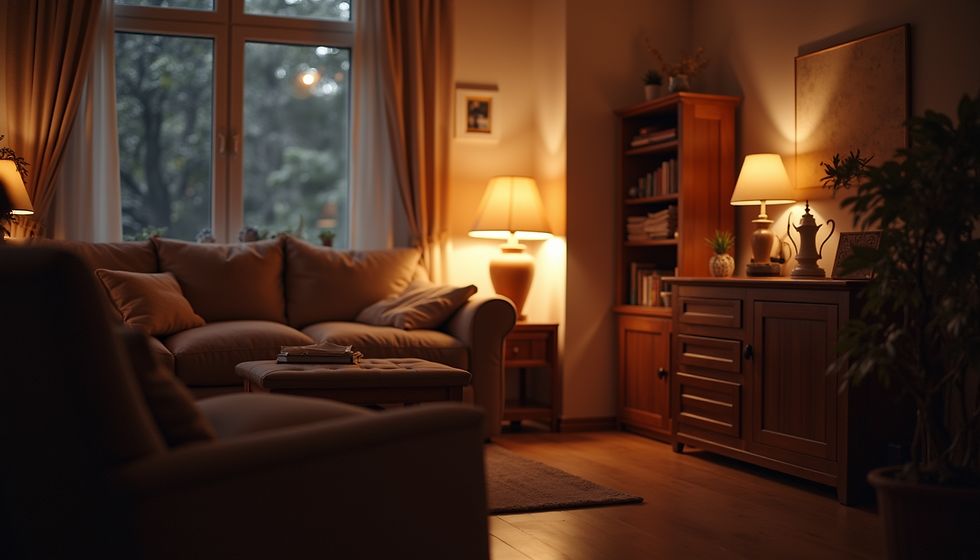Harnessing the Power of Sleep
- Laura

- Aug 9, 2023
- 3 min read
The Sleep-Anxiety Connection
We all know the feeling of anxiety keeping us tossing and turning at night. But did you know that improving your sleep habits can significantly impact your anxiety levels?
The relationship between sleep and anxiety is complex and reciprocal, meaning that poor sleep can exacerbate anxiety, and heightened anxiety can lead to sleep disturbances. So how can sleep impact our thoughts, feelings and behaviours?

Increased Sensitivity to Stress: When you're sleep-deprived, your ability to handle stress is compromised. You become more sensitive to both physical and emotional stressors, which can trigger or intensify feelings of anxiety.
Heightened Emotional Reactivity: Sleep deprivation affects the brain's emotional processing, making you more reactive to negative emotions. This means that small stressors or challenges that you might handle well with adequate sleep can feel overwhelming when you're sleep-deprived, leading to heightened anxiety.
Impaired Cognitive Function: Lack of sleep impairs cognitive functions like decision-making, problem-solving, and attention. This cognitive fog can lead to overthinking and excessive worrying, common characteristics of anxiety disorders.
Increased Ruminative Thinking: Sleep deprivation can increase rumination – the act of dwelling on negative thoughts and experiences. This constant replay of worries can intensify feelings of anxiety and make it difficult to relax.
Disruption of Neurotransmitters: Sleep plays a crucial role in regulating neurotransmitters that impact mood, such as serotonin and dopamine. A lack of sleep can disrupt these neurotransmitter systems, leading to imbalances that contribute to anxiety.
Altered Fear Response: Sleep deprivation can affect the amygdala, a brain region responsible for processing fear and anxiety. This alteration can make you more prone to perceiving threats and responding with heightened anxiety.
Physical Symptoms: Sleep deprivation can exacerbate physical symptoms associated with anxiety, such as muscle tension, restlessness, and irritability. These physical symptoms can, in turn, fuel feelings of anxiety.
Cyclic Relationship: Anxiety can contribute to sleep difficulties, and poor sleep can worsen anxiety. This creates a vicious cycle where anxiety makes it difficult to fall asleep, and inadequate sleep intensifies anxiety.
Reduced Coping Abilities: Sleep deprivation diminishes your ability to cope with daily stressors. This reduction in coping skills can lead to an accumulation of stress and anxiety over time.
So what can help create regular, quality sleep?
There are numerous tools and strategies to help create a more consistent, restful sleep routine, and the best options are simply the ones that feel best for you! That being said, some of the following strategies are certainly a powerful starting point.
1. Create a Soothing Bedtime Ritual: Wind down with calming activities before bed, such as reading, gentle stretches, or listening to relaxing music. Engaging in these rituals signals to your brain that it's time to relax.
2. Embrace a Consistent Sleep Schedule: Set a regular sleep schedule to regulate your body's internal clock. Consistency helps improve the quality of your sleep, making you feel more refreshed and less anxious during the day.
3. Mindfulness Meditation for Sleep: Practice mindfulness meditation before bed to quiet racing thoughts. This technique can help ease anxiety and prepare your mind for restful sleep.

Prioritizing healthy sleep habits is crucial for managing anxiety effectively.
If you're struggling with anxiety, addressing sleep disturbances can be an essential part of your treatment plan.
Establishing a consistent sleep routine, creating a comfortable sleep environment, and seeking professional help if needed can all contribute to improving both sleep quality and overall anxiety levels.




Comments